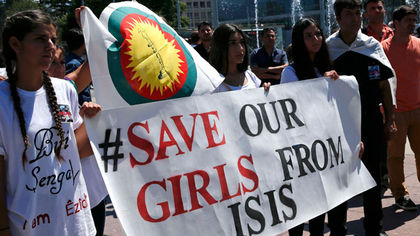
The calls come to Khaleel’s phone every day, dozens every week: Women and girls, held captive by the Islamic State, beg us to rescue them.
Like us, they are Yazidis. And in the wickedest of ironies, they are survivors of genocide, kept alive by the Islamic State to be raped and subjected to sexual slavery. They have heard about our rescue network and reach us on cellphones that they have managed to hide.
We save as many victims as we can and provide care to help rehabilitate them. Thus far, however, we’ve been able to help only a small number of the 3,700 who are enslaved. We believe most are in Mosul, which is Iraq’s second-largest city, the Islamic State’s most important stronghold after Raqqa in Syria and the largest urban center under the Islamic State’s control. So intense is the suffering of these women and girls that they tell us that they want the United States and other countries to attack Mosul, even if the bombs pose a threat to their lives.
The bombs have already started to fall in Mosul. A coalition of troops led by the Iraqi army — and including Kurdish peshmerga, Turkish and U.S. forces — recently launched its initial assault on the city in what is expected to be a major battle that lasts several weeks. But whether it leads to the liberation of Yazidi women and girls or to further suffering may depend on the current and future actions of the forces fighting the Islamic State — and the governments to which they belong.
There is an urgent need for measures to prevent the Islamic State from fleeing with its captives. As it stands now, we know that the Islamic State is holding a large majority of its Yazidi captives in Mosul, and a military victory by the coalition would offer an opportunity for their liberation. They will be nearly impossible to locate, however, if Islamic State militants are permitted to take them even deeper “underground.”
Encouraging words are coming from some quarters. “The minute we are on the verge of the city, we will notify those assets to go in and collect as many girls as possible before going in,” Haitham al-Malaki, an intelligence chief with the Iraqi army, told Fox News. “We will also open a rescue path to ensure safe passage for the ones we can’t get beforehand.”
But words are not actions; over the past two years the Iraqi government has shown little concern for the plight of the Yazidis. The United States, which intervened militarily in Iraq in 2014 largely in response to the genocide of the Yazidis, should seek to ensure that its ally in Baghdad prioritizes the safety of the Islamic State’s captives during the assault on Mosul.
Hundreds of thousands of people have already fled Mosul, and the pace of the exodus will surely increase in the coming days and weeks. We urge the United States and other countries to support German Chancellor Angela Merkel’s call for the creation of a safe zone where Yazidis and other vulnerable civilians could take refuge.
Beyond Mosul, thousands of Yazidis are living in internally displaced person (IDP) camps in Iraqi Kurdistan. These camps are severely under-resourced and in need of financial support. Many survivors long to return to their homes in Sinjar, where Yazidis have lived for hundreds of years. But the danger from the Islamic State persists there. With security and development assistance from the United States and other countries, the Yazidis might be able to go home and begin to rebuild their lives.
Essential to rebuilding and healing is mourning. Yet many survivors are having trouble finding and identifying their lost loved ones because their bodies — often located in unprotected mass grave-sites — have been incinerated or damaged by the elements. The longer these sites go unprotected, the less chance there is that Yazidi survivors will be able to properly mourn. Surely it is not too much to ask that the Yazidis receive help securing these grave-sites.
Finally, we urge the United States and its allies to seek the accountability that justice demands. The Iraqi government cannot refer the situation to the International Criminal Court (ICC) because it hasn’t ratified the Rome Statute. There’s a simple solution: The Iraqi government could ratify the statute, and under pressure, it might do just that. The United Nations Security Council could also make the referral to the ICC, yet this might require a diplomatic effort from the United States to ensure that neither Russia nor China uses its veto. Whatever its path to the ICC, a referral would allow for an official acknowledgment of the genocide and other horrific crimes that the Islamic State has committed against the Yazidis.
Every time our phones ring, the voice on the other end could belong to a woman or girl enslaved by the Islamic State. It’s difficult to convey what it feels like to hear the agonized voices. Recently, a woman whom we were unable to help begged us to carry her message to anyone in power. She said, “Tell them: ‘If you can’t save us, please bomb us. We can’t bear to live.’ ”
We hope and pray that the United States and its allies do everything they can to ensure that the liberation of Mosul is the liberation of the Yazidis as well.
Ameena Saeed Hasan and Khaleel Aldakhi are Iraqi Yazidi activists who run a rescue network saving Yazidi women and girls who have been enslaved by the Islamic State. They are the recipients of the 2016 Human Rights First Award.
Washington Post

Leave a Reply
You must be logged in to post a comment.